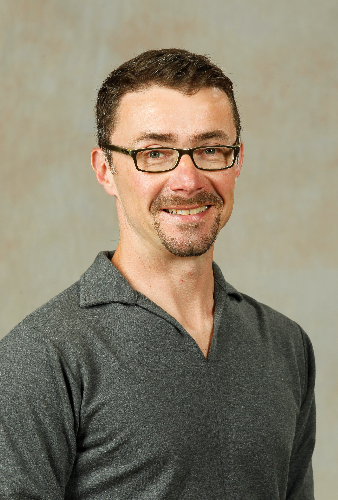Professor of English and Cultural Studies Tom Roach, Ph.D. has been coordinator of Bryant University’s Women, Gender, and Sexuality Studies (WGSS) program for more than a decade, nearly half of its 25 years in existence. The curriculum, which works to uncover the truths behind how we understand — and construct — ideas regarding identity, perception, and equality, he says, has never been more relevant.
“I tell my students, if we were in certain states in this country, this course would not be taught. In fact, it would be illegal to be in front of a classroom teaching this course,” Roach points out, citing recent legislation in Florida and other states. “The information you’re learning has not only been suppressed for various reasons, it's literally been outlawed because some people think it’s dangerous.
“If various social institutions find it necessary to outlaw discussions of these topics, they clearly hold a lot of power," he states. "Our job is to understand why.”
Exploring intersectionality
For more than a quarter century, Bryant’s WGSS program has provided avenues for students to apply a critical lens to fundamental structures of human interaction. By studying scholarship regarding women’s history and culture, gender studies, sexuality studies, and feminist theory, they examine important questions about how gender and sexuality have been used as systems of social control throughout history — and how they’ve also served as catalysts for real change.
“We see ourselves as a bit of an underdog program here, but we teach in this program because we believe in it,” says Roach. “We want Bryant's students to have an opportunity to engage with these important issues because we believe it will make them more thoughtful, more reflective, and more understanding. It will help them to become more worldly citizens.”

Ph.D. coordinator of Bryant University’s Women,
Gender, and Sexuality Studies (WGSS) program.
Using a range of disciplinary methodologies and perspectives, students develop a deeper understanding of the structures of power that shape gender and sexual identity — including how key societal concepts are developed and reinforced by authoritative bodies, mass media, and pop culture. The program examines subjects from a range of perspectives, including history, sociology, media studies, and psychology and includes courses ranging from “The Sociological Imagination: What We See When We Watch T.V.” to “American Women's History” to “Sex, Love, and Social Media.”
“One of my favorite things about the program itself is its intersectionality,” says Roach. “It’s a gender and sexuality studies program, but when you start to study gender and sexuality, you have to study race relations and you have to study issues concerning class. You can't just pull one out and analyze it in a vacuum.”
For Emma Lacey ’23, who concentrated in WGSS, reading the works of diverse authors such as Toni Morrison and Audre Lorde was transformative. “Just by being exposed to different perspectives, just by thinking about them, and having these conversations, it changes you a little bit,” says Lacey. “It makes you more open and more thoughtful, and it changes how you see the world. When your perspective widens like that, ignorance is no longer bliss, and your head is out of the sand.”
Lacey points to a documentary on the $186 million birthing industry she watched in one of Roach’s WGSS courses, and the ensuing discussion, as especially, and unexpectedly, eye-opening. “You’re learning about things that not only make an impact on you, but you also find that you need to discuss them with your friends outside of class,” she says.
Finding the truth
Along with learning new perspectives from others, says Roach, the program is about examining ourselves. “There are so many layers of misinformation and ideological bunk that needs to be stripped away before students — before all of us — can then be honest with ourselves,” he notes.
Throughout human history, Roach states, gender and sexuality have been used to divide, distract, and confuse people. It’s also aided in the othering and persecution of far too many, from denying the women the vote to current legislation targeting transgender Americans. The WGSS program, he says, aims to shed light on misconceptions and outright manipulations.
Taking that leap, Roach admits, can be uncomfortable. “I took a women's studies course as an undergraduate, and it was a very difficult course for me because the ideas were so unfamiliar,” he remembers. “I was a confident student, and felt like I could conquer the world, but I took this course, and I was so challenged because I was brought up against these ideas and these histories. It was just such a shock to the system—the best kind of shock.
“Once you start to crack the armor of so-called ‘common sense’ knowledge about gender and race and sexuality, it's really eye-opening.”
The WGSS program’s courses, Roach stresses, are open to everyone, and thrive on spirited — and respectful — discussion. “No one is looking for this to be an indoctrination,” says Roach. “It's not about shaming. It's not about making people feel bad about their identities. It's about understanding how we got to where we are today, recognizing some of the injustices that exist with regard to race, gender, sexuality, and trying to forge a better path.”
This fall, Morgan Marckres ’23, another WGSS concentrator, is headed to Rutgers law school and is considering a career in furthering social justice. She says the WGSS program, including a capstone project through which she investigated the increase in fetal heartbeat laws across the country, and how they can be used as a tool for persecution, was a key factor in that consideration. “It pushes you to think further and deeper to consider ‘What’s next?’” Marckres says. “You learn so much, it makes you ask yourself: what’s the next step, how can you help make things better?”